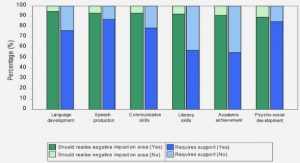Get Complete Project Material File(s) Now! »
CONTEXT OF THE STUDY
On account of the wide scope of the different disciplines consulted for the conceptual foundations of this thesis, the main difficulty has been to recognize what to leave out. The thesis reflects large parts of psychology and sociology, and consequently to reflect suitable subject breadth is difficult. Literature in entrepreneurship and other fields was investigated for a general overview of concepts, constructs, and operational definitions that were appropriately linked to the study objectives, since basing variables on conceptually and theoretically sound foundations of other disciplines helps increase the intellectual legitimacy of entrepreneurship.
IMPORTANCE OF STUDY
Based on the Global Entrepreneurship Monitor (GEM) report (Foxcroft, Wood, Kew, Herrington, Segal, 2002) South Africa has the lowest Total Entrepreneurship Activity (TEA) rate of any developing country measured, which means that South Africa has the smallest proportion of entrepreneurs compared to any other developing country. This is significant in a country where entrepreneurial ventures account for one third of total employment.
OBJECTIVES OF STUDY
While the relationship between self-efficacy and entrepreneurial intentions has been extensively documented (Krueger et al, 2000 & Krueger & Brazeal, 1994), thesis seeks to extend this relationship by understanding the moderating effect of cultural dimensions and self efficacy on entrepreneurial intentions i.e. the influence culture and self efficacy have on entrepreneurial intentions.
OUTLINE OF PROPOSED STUDY
This introductory chapter outlines the basis of the study undertaken. The context of the study is framed and the relevance of the selected constructs is described. The objectives of the study are delineated and hypotheses are formulated on the basis of previous research findings that follow in the subsequent chapters.
CHAPTER 1 INTRODUCTION
1.1 CONTEXT OF THE STUDY
1.2 IMPORTANCE OF STUDY
1.3 OBJECTIVES OF STUDY
1.4 OUTLINE OF PROPOSED STUDY
CHAPTER 2 LITERATURE REVIEW ON ENTREPRENEURIAL INTENTIONS AND SELF-EFFICACY
2.1 INTRODUCTION
2.2 ENTREPRENEURIAL EMPOWERMENT
2.3 CONCEPTUAL FOUNDATIONS
2.3.1 AGENTIC THEORY
2.3.2 ENTREPRENEURIAL INTENTIONS
2.3.3 SELF EFFICACY
2.3.3.1 Generative capability of self efficacy
2.4 ENTREPRENEURIAL MOTIVATION
2.4.1 ENTREPRENEURIAL COGNITIONS AND PERSONALITY
2.5 CULTURE AND SELF-EFFICACY
2.5.1 COLLECTIVE EFFICACY
2.5.2 CULTURAL VALUES AND SELF- EFFICACY BELIEFS
2.6 SELF- EFFICACY LINKED TO ENTREPRENEURSHIP
2.7 ENTREPRENEURIAL INTENTIONS MEAUSURE
2.8 ENTREPRENEURIAL SELF- EFFICACY MEASURE
2.8.1 RELIABILITY AND VALIDITY OF SELF- EFFICACY
2.8.2 OPERATIONALISING THE SELF- EFFICACY MEASURE
2.9 CONTRA ARGUMENTS
2.10 CHAPTER SUMMARY
CHAPTER 3 LITERATURE REVIEW ON CULTURAL INFLUENCES ON ENTREPRENEURSHIP
3.1 INTRODUCTION
3.2 PERSPECTIVES ON CULTURAL THEORY
3.3 CULTURAL VALUES
3.4 NATIONAL CULTURE
3.5 CULTURAL INFLUENCES ON ENTREPRENEURIAL ACTIVITY
3.6 CULTURAL DIMENSIONS LINKED TO ENTREPRENEURSHIP
3.7 PERSONALITY CONCEPTIONS IN CULTURE
3.7.1 INDIVIDUALISM AND COLLECTIVISM
3.8 MODERATING EFFECTS ON ENTREPRENEURSHIP
3.9 CULTURAL MEASURE
3.9.1 UNIT OF ANALYSIS
3.9.2 VALUE SURVEY MODULE
3.10 CONCEPTUAL AND DESIGN CHALLENGES
3.11 CHAPTER SUMMARY
CHAPTER 4 RESEARCH DESIGN
4.1 INTRODUCTION
4.2 METHODOLOGY
4.3 DATA COLLECTION AND SAMPLING
4.3.1 FIELDWORK
4.4 DATA ANALYSIS TECHNIQUES
CHAPTER 5 PRESENTATION AND INTERPRETATION OF FINDINGS
5.1 FACTOR AND ITEM ANALYSIS
5.2 DESCRIPTIVE STATISTICS
5.3 ANOVA
5.4 CORRELATIONS
5.5 MULTIPLE REGRESSION
5.6 STUDY LIMITATIONS
CHAPTER 6 CONCLUSIONS AND IMPLICATIONS
6.1 DISCUSSION
6.2 RELEVANCE OF FINDINGS
6.3 FUTHER RESEARCH
BIBLIOGRAPHY
GET THE COMPLETE PROJECT
UNDERSTANDING THE MODERATING EFFECT OF CULTURE AND SELF- EFFICACY ON ENTREPRENEURIAL INTENTIONS






